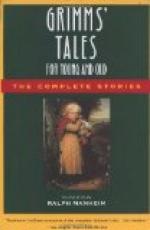On turning round to view the house, new tokens of desolation were visible. Its shattered casements and worm-eaten doors, with tufts of weed growing at each corner, showed that for many years the front of the mansion had not been inhabited or its doors opened. One evidence of fallen grandeur was highly characteristic—over the porch the family-arms had been carved in stone, but was now scarcely distinguishable from dilapidation: a sparrow had established a comfortable nest in the mouth of the helmet, and a griffin ‘rampant’ had fallen from his place beside the shield, and tamely lay overgrown with weeds.
These observations were interrupted by the light step of my cousin, who came to inform me that the lady of the house, after much, persuasion, had consented to receive me. Conducting me to the back of the mansion, my fair guide took me through a dark passage into a sort of kitchen. A high and ample ‘settle’ stood, as is usual in farmhouses, before the hearth. In one corner of this seat reclined a figure bent with age, her face concealed by a thick veil. In the other corner was an old cheerful-looking woman, busily knitting, and mumbling rather than singing a quaint old ballad.
The mistress of Coote-down made a feeble attempt to rise when my cousin presented me; but I entreated her to keep her seat. Having procured a chair for my fellow-visitor (for the old domestic took not the smallest notice of us, but went on with her work as if we were not present), I established myself beside the hostess, and addressed to her a few common-place words of greeting. She replied in a voice far less feeble than I had expected to hear from so decrepit a person; but what she said was no answer to my salutation. She went on with surprising clearness, explaining to me the degree of relationship which we bore to each other, and traced my pedigree till it joined her own; continued our mutual genealogy back to the Damnonii of Cornwall, hinting that our ancestors of that period were large mining proprietors, who sold tin to the Phoenicians! At first she spoke with doubt and hesitation, as if she feared to make some mistake; but the moment she got to where our branches joined—to the trunk, as it were, of our family-tree—she went on glibly, like child repeating a well-conned lesson. All this while the old attendant kept up the unceasing accompaniment of her ballad, which she must have sung through several times, for I heard the first line—
’A bailie’s daughter, fair was she’—
at least thrice.
Though I addressed several questions to my singular relation, she made no attempt to answer them. It seemed that what she had uttered was all she was capable of; and this, I learned afterwards, was partly true. Circumstances of her early life had given her a taste for family history, particularly that of her own, and her faculties, though otherwise impaired, still retained everything relating to what concerned her ancestry.




